-
Sale!
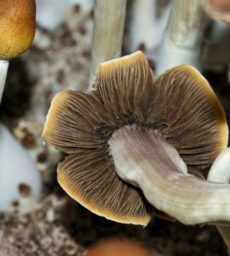
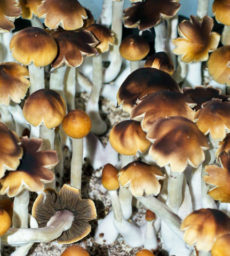
Puerto Rican Spores
$19.98 – $217.50Puerto Rican Spores
Puerto Rican Spores mushrooms and their spores are also some of the most sought after psilocybe cubensis magic mushrooms ever found. Spores from the Puerto Rican Spores mushroom are available here at SporeStore.com because you asked for them! Find both mushroom spore syringes and also mushroom spore prints. This psilocybe cubensis magic mushroom was first discovered on a farm growing in a pile of dung and straw as its mushroom substrate in Puerto Rico. There is no psilocybin or psilocin contained within magic mushroom spores, making them completely legal to purchase and posses in most jurisdictions throughout the USA. As well as make sure to check your local laws before ordering. The original Puerto Rican Spores mushroom spores’ genetics from the true Puerto Rican Spores psilocybe cubensis mushrooms from Puerto Rico are brought to you by SporeStore.com, the leader in mushroom spores.
Spores from this strain are in abundance as it’s a healthy spore depositor.
Puerto Rican Spores magic mushrooms are easy to grow. Check your local mushroom growing laws. Growing mushrooms for identification and taxonomy purposes? We have your spores!
In addition to the Puerto Rican Spores spores, here are some other mushroom spores that you may be interested in reviewing: Alacabenzi mushroom magic spores, B+ mushroom spores which is also called B Plus mushroom spores, Malaysia Spores mushroom spores, PES Hawaiian mushroom spores, Ecuador spores
Furthermore check out our new Mushroom Grinder!
Mushroom Capsules found here…
More Detail:
Habitat: Bovine, Equine Dung and Enriched Soils
Climate: Subtropical
Strain Origin: Puerto Rico
Cap: 50+ mm in diameter, convex to broadly convex to plane at maturity. Reddish cinnamon brown maturing to golden brown to light yellow because the surface is dry with pronounced and persistent remnants of universal veil on cap (spots) and the flesh is white soon bruising bluish green.
Stem: 125+ mm in length, yellowish. Flesh bruising bluish green where injured. Persistent membranous annulus (ring) from partial veil that becomes dusted with purple brown spores at maturity.
Gills: Attachment adnate to adnexed. Grayish coloration in young fruit bodies becoming nearly black in maturity.
Spores: Dark purplish brown, subellipsoid on 4-spored basidia
Storage: Store in a dark, cool and dry place and use within six months after delivery!
Taxonomy:
Kingdom: Fungi
Division: Basidiomycota
Class: Agaricomycetes
Order: Agaricales
Family: Strophariaceae
Genus: Psilocybe
Spores: purplish brown to dark brown, 11.5 – 17 x 8 – 11 µm, ellipsoidHabitat and distribution in nature:
Rye grain, wheat straw, horse or cow manure. This species can be found in the subtropical and tropical climate zones all around the globe under the following conditions: Spawn run incubation: 28 °C | Primordia formation: 23.3 – 25.6 °C | Fruiting: 23 – 26 °C
A 2011 study also found that more than a year after participants had a single psilocybin experience, their self-reported measures of openness remained significantly elevated, which researches in this study and beyond attribute to a somewhat mysterious but powerful aspect of a mushroom trip: the mystical experience.
In this case, a mystical experience is defined as “feelings of unity and interconnectedness with all people and things, a sense of sacredness, feelings of peace and joy, a sense of transcending normal time and space, ineffability, and an intuitive belief that the experience is a source of objective truth about the nature of reality.” The religious identification of people who have reported having a mystical-type experience during a mushroom trip span the spectrum, but interestingly the profundity of such experiences don’t seem to correlate to religious belief—even atheists have reported the importance of their psilocybin-induced mystical experiences. Additionally, research has shown that the more intense the mystical experience, the greater the positive, long-term changes a person sees.
These subjective effects, such as feelings of interconnectedness, are likely a result of psilocybin’s ability to decrease the interconnectivity of integration hubs in the brain. In plain speak, that means psilocybin allows for more “cross-talk” between regions of the brain that are typically segregated. Researchers speculate that this enables a state of “unconstrained cognition,” meaning the ways we typically organize, categorize, and differentiate the aspects of conscious experience are broken down, and thinking becomes more flexible. To understand how this might be beneficial, it helps to know that similar brain activity patterns are also observed during various states of meditation.
Habitat: Bovine, Equine Dung and Enriched Soils
Climate: Subtropical
Strain Origin: Puerto Rico
Cap: 25-50+ mm in diameter, convex to broadly convex to plane at maturity often with persistent acute umbo (nipple). Reddish cinnamon brown maturing to golden brown to light yellow with nearly white edges. Surface dry lacking remnants of universal veil on cap (spots). Flesh white soon bruising bluish green.
Stem: 150+ mm in length, yellowish. Flesh bruising bluish green where injured. Persistent membranous annulus (ring) from partial veil that becomes dusted with purple brown spores at maturity.
Gills: Attachment adnate to adnexed. Grayish coloration in young fruit bodies becoming nearly black in maturity.
Spores: Dark purplish brown, subellipsoid on 4-spored basidia
Habitat: Bovine, Equine Dung and Enriched Soils
Climate: Subtropical
Strain Origin: Puerto Rico, near the town of Canovanas located on the Northeast side of the island.
Cap: 50-75 mm in diameter, convex to broadly convex to nearly plane at maturity. Brown maturing to golden brown to light yellow. Surface dry with fine persistent remnants of universal veil on cap (spots). Flesh white soon bruising bluish green.
Stem: 125+ mm in length, yellowish. Flesh bruising bluish green where injured. Persistent membranous annulus (ring) from partial veil that becomes dusted with purple brown spores at maturity.
Gills: Attachment adnate to adnexed. Grayish coloration in young fruit bodies becoming nearly black in maturity.
Spores: Dark purplish brown, subellipsoid on 4-spored basidia
Form can be quite variable under laboratory conditions.
-
Sale!
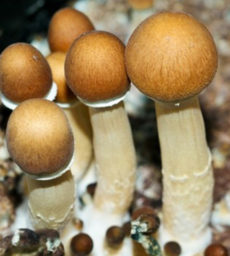
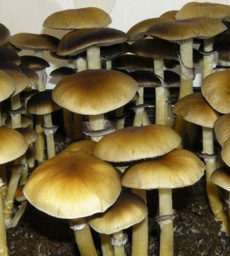
Mazatapec Spores
$19.98 – $217.50Mazatapec Spores
Mazatapec Spores mushrooms and their spores are also some of the most sought after psilocybe cubensis magic mushrooms ever found. Spores from the Mazatapec Spores mushroom are available here at SporeStore.com because you asked for them! Find both mushroom spore syringes and also mushroom spore prints. This psilocybe cubensis magic mushroom was first discovered on a farm growing in a pile of dung and straw as its mushroom substrate in Mexico. There is no psilocybin or psilocin contained within magic mushroom spores, making them completely legal to purchase and posses in most jurisdictions throughout the USA. As well as make sure to check your local laws before ordering. The original Mazatapec Spores mushroom spores’ genetics from the true Mazatapec Spores psilocybe cubensis mushrooms from Mexico are brought to you by SporeStore.com, the leader in mushroom spores.
Spores from this strain are in abundance as it’s a healthy spore depositor.
Mazatapec Spores magic mushrooms are easy to grow. Check your local mushroom growing laws. Growing mushrooms for identification and taxonomy purposes? We have your spores!
In addition to the PES Amazonian Spores spores, here are some other mushroom spores that you may be interested in reviewing: Alacabenzi mushroom magic spores, B+ mushroom spores which is also called B Plus mushroom spores, Malaysia Spores mushroom spores, PES Hawaiian mushroom spores, Ecuador spores
Furthermore check out our new Mushroom Grinder!
Mushroom Capsules found here…
More Detail:
Habitat: Bovine, Equine Dung and Enriched Soils
Climate: Subtropical
Strain Origin: Mexico
Cap: 50+ mm in diameter, convex to broadly convex to plane at maturity. Reddish cinnamon brown maturing to golden brown to light yellow because the surface is dry with pronounced and persistent remnants of universal veil on cap (spots) and the flesh is white soon bruising bluish green.
Stem: 125+ mm in length, yellowish. Flesh bruising bluish green where injured. Persistent membranous annulus (ring) from partial veil that becomes dusted with purple brown spores at maturity.
Gills: Attachment adnate to adnexed. Grayish coloration in young fruit bodies becoming nearly black in maturity.
Spores: Dark purplish brown, subellipsoid on 4-spored basidia
Storage: Store in a dark, cool and dry place and use within six months after delivery!
Taxonomy:
Kingdom: Fungi
Division: Basidiomycota
Class: Agaricomycetes
Order: Agaricales
Family: Strophariaceae
Genus: Psilocybe
Spores: purplish brown to dark brown, 11.5 – 17 x 8 – 11 µm, ellipsoidHabitat and distribution in nature:
Rye grain, wheat straw, horse or cow manure. This species can be found in the subtropical and tropical climate zones all around the globe under the following conditions: Spawn run incubation: 28 °C | Primordia formation: 23.3 – 25.6 °C | Fruiting: 23 – 26 °C
A 2011 study also found that more than a year after participants had a single psilocybin experience, their self-reported measures of openness remained significantly elevated, which researches in this study and beyond attribute to a somewhat mysterious but powerful aspect of a mushroom trip: the mystical experience.
In this case, a mystical experience is defined as “feelings of unity and interconnectedness with all people and things, a sense of sacredness, feelings of peace and joy, a sense of transcending normal time and space, ineffability, and an intuitive belief that the experience is a source of objective truth about the nature of reality.” The religious identification of people who have reported having a mystical-type experience during a mushroom trip span the spectrum, but interestingly the profundity of such experiences don’t seem to correlate to religious belief—even atheists have reported the importance of their psilocybin-induced mystical experiences. Additionally, research has shown that the more intense the mystical experience, the greater the positive, long-term changes a person sees.
These subjective effects, such as feelings of interconnectedness, are likely a result of psilocybin’s ability to decrease the interconnectivity of integration hubs in the brain. In plain speak, that means psilocybin allows for more “cross-talk” between regions of the brain that are typically segregated. Researchers speculate that this enables a state of “unconstrained cognition,” meaning the ways we typically organize, categorize, and differentiate the aspects of conscious experience are broken down, and thinking becomes more flexible. To understand how this might be beneficial, it helps to know that similar brain activity patterns are also observed during various states of meditation.
Habitat: Bovine, Equine Dung and Enriched Soils
Climate: Subtropical
Strain Origin: Mexico
Cap: 25-50+ mm in diameter, convex to broadly convex to plane at maturity often with persistent acute umbo (nipple). Reddish cinnamon brown maturing to golden brown to light yellow with nearly white edges. Surface dry lacking remnants of universal veil on cap (spots). Flesh white soon bruising bluish green.
Stem: 150+ mm in length, yellowish. Flesh bruising bluish green where injured. Persistent membranous annulus (ring) from partial veil that becomes dusted with purple brown spores at maturity.
Gills: Attachment adnate to adnexed. Grayish coloration in young fruit bodies becoming nearly black in maturity.
Spores: Dark purplish brown, subellipsoid on 4-spored basidia
Habitat: Bovine, Equine Dung and Enriched Soils
Climate: Subtropical
Strain Origin: Mexico
Cap: 50+ mm in diameter, convex to broadly convex at maturity occasionally with acute umbo. Dark cinnamon brown maturing to golden brown. Surface dry lacking remnants of universal veil on cap (spots). Flesh white soon bruising bluish green.
Stem: 75-125 mm in length, yellowish to buff. Flesh bruising bluish green where injured. Persistent membranous annulus (ring) from partial veil that becomes dusted with purple brown spores at maturity.
Gills: Attachment adnate to adnexed. Grayish coloration in young fruit bodies becoming nearly black in maturity.
Spores: Dark purplish brown, subellipsoid on 4-spored basidia
-
Sale!
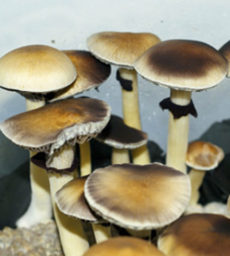
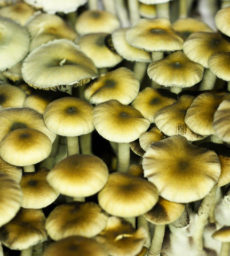
Nepal Chitwan Spores
$19.98 – $217.50Nepal Chitwan Spores
Nepal Chitwan Spores mushrooms and their spores are also some of the most sought after psilocybe cubensis magic mushrooms ever found. Spores from the Nepal Chitwan Spores mushroom are available here at SporeStore.com because you asked for them! Find both mushroom spore syringes and also mushroom spore prints. This psilocybe cubensis magic mushroom was first discovered on a farm growing in a pile of dung and straw as its mushroom substrate in Nepal. There is no psilocybin or psilocin contained within magic mushroom spores, making them completely legal to purchase and posses in most jurisdictions throughout the USA. As well as make sure to check your local laws before ordering. The original Nepal Chitwan Spores mushroom spores’ genetics from the true Nepal Chitwan Spores psilocybe cubensis mushrooms from Nepal are brought to you by SporeStore.com, the leader in mushroom spores.
Spores from this strain are in abundance as it’s a healthy spore depositor.
Nepal Chitwan Spores magic mushrooms are easy to grow. Check your local mushroom growing laws. Growing mushrooms for identification and taxonomy purposes? We have your spores!
In addition to the Nepal Chitwan Spores spores, here are some other mushroom spores that you may be interested in reviewing: Alacabenzi mushroom magic spores, B+ mushroom spores which is also called B Plus mushroom spores, Malaysia Spores mushroom spores, PES Hawaiian mushroom spores, Ecuador spores
Furthermore check out our new Mushroom Grinder!
Mushroom Capsules found here…
More Detail:
Habitat: Bovine, Equine Dung and Enriched Soils
Climate: Subtropical
Strain Origin: Nepal
Cap: 50+ mm in diameter, convex to broadly convex to plane at maturity. Reddish cinnamon brown maturing to golden brown to light yellow because the surface is dry with pronounced and persistent remnants of universal veil on cap (spots) and the flesh is white soon bruising bluish green.
Stem: 125+ mm in length, yellowish. Flesh bruising bluish green where injured. Persistent membranous annulus (ring) from partial veil that becomes dusted with purple brown spores at maturity.
Gills: Attachment adnate to adnexed. Grayish coloration in young fruit bodies becoming nearly black in maturity.
Spores: Dark purplish brown, subellipsoid on 4-spored basidia
Storage: Store in a dark, cool and dry place and use within six months after delivery!
Taxonomy:
Kingdom: Fungi
Division: Basidiomycota
Class: Agaricomycetes
Order: Agaricales
Family: Strophariaceae
Genus: Psilocybe
Spores: purplish brown to dark brown, 11.5 – 17 x 8 – 11 µm, ellipsoidHabitat and distribution in nature:
Rye grain, wheat straw, horse or cow manure. This species can be found in the subtropical and tropical climate zones all around the globe under the following conditions: Spawn run incubation: 28 °C | Primordia formation: 23.3 – 25.6 °C | Fruiting: 23 – 26 °C
A 2011 study also found that more than a year after participants had a single psilocybin experience, their self-reported measures of openness remained significantly elevated, which researches in this study and beyond attribute to a somewhat mysterious but powerful aspect of a mushroom trip: the mystical experience.
In this case, a mystical experience is defined as “feelings of unity and interconnectedness with all people and things, a sense of sacredness, feelings of peace and joy, a sense of transcending normal time and space, ineffability, and an intuitive belief that the experience is a source of objective truth about the nature of reality.” The religious identification of people who have reported having a mystical-type experience during a mushroom trip span the spectrum, but interestingly the profundity of such experiences don’t seem to correlate to religious belief—even atheists have reported the importance of their psilocybin-induced mystical experiences. Additionally, research has shown that the more intense the mystical experience, the greater the positive, long-term changes a person sees.
These subjective effects, such as feelings of interconnectedness, are likely a result of psilocybin’s ability to decrease the interconnectivity of integration hubs in the brain. In plain speak, that means psilocybin allows for more “cross-talk” between regions of the brain that are typically segregated. Researchers speculate that this enables a state of “unconstrained cognition,” meaning the ways we typically organize, categorize, and differentiate the aspects of conscious experience are broken down, and thinking becomes more flexible. To understand how this might be beneficial, it helps to know that similar brain activity patterns are also observed during various states of meditation.
Habitat: Bovine, Equine Dung and Enriched Soils
Climate: Subtropical
Strain Origin: Nepal
Cap: 25-50+ mm in diameter, convex to broadly convex to plane at maturity often with persistent acute umbo (nipple). Reddish cinnamon brown maturing to golden brown to light yellow with nearly white edges. Surface dry lacking remnants of universal veil on cap (spots). Flesh white soon bruising bluish green.
Stem: 150+ mm in length, yellowish. Flesh bruising bluish green where injured. Persistent membranous annulus (ring) from partial veil that becomes dusted with purple brown spores at maturity.
Gills: Attachment adnate to adnexed. Grayish coloration in young fruit bodies becoming nearly black in maturity.
Spores: Dark purplish brown, subellipsoid on 4-spored basidia
Habitat: Bovine, Equine Dung and Enriched Soils
Climate: Subtropical
Strain Origin: Nepal, Chitwan. Original collection material was obtained by Baerbel in the village of Sauraha near the Chitwan Jungle of Nepal. Three specimens were located in otherwise dry climate conditions (three months after typical mushroom seasons), and shaded by a nearby tree. Specimens picked from what appeared to be either elephant or rhino dung. Original sample specimen pictures below and right.
Cap: 20-70 mm in diameter, hemispheric expanding to nearly plane with age. Golden brown maturing to light brown. Fine fibrillose veil remnants when young that soon mostly disappear. Flesh yellowish white soon bruising bluish green.
Stem: 150-200+ mm in length. Typically equal, sometimes slightly enlarged at base. Yellowish to buff with a reflective sheen, bruising bluish, semi hollow with remains of the partial veil.
Gills: Attachment adnate to adnexed. Yellowish coloration in young fruit bodies becoming darker in maturity. Remains of the partial veil attached at the outer circumference of the cap.
Spores: Dark purplish brown, subellipsoid on 4-spored basidia
-
Sale!
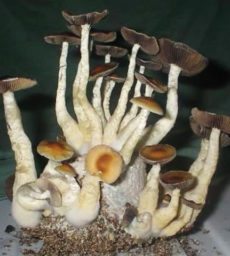
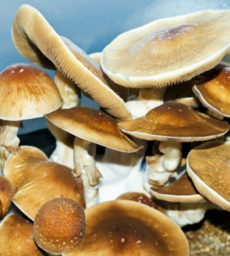
PF Classic Professor Fanaticus Spores
$19.98 – $217.50PF Classic Professor Fanaticus Spores
PF Classic Professor Fanaticus Spores mushrooms and their spores are also some of the most sought after psilocybe cubensis magic mushrooms ever found. Spores from the PF Classic Professor Fanaticus Spores mushroom are available here at SporeStore.com because you asked for them! Find both mushroom spore syringes and also mushroom spore prints. This psilocybe cubensis magic mushroom was first discovered on a farm growing in a pile of dung and straw as its mushroom substrate in Florida. There is no psilocybin or psilocin contained within magic mushroom spores, making them completely legal to purchase and posses in most jurisdictions throughout the USA. As well as make sure to check your local laws before ordering. The original PF Classic Professor Fanaticus Spores mushroom spores’ genetics from the true PF Classic Professor Fanaticus Spores psilocybe cubensis mushrooms from Florida are brought to you by SporeStore.com, the leader in mushroom spores.
Spores from this strain are in abundance as it’s a healthy spore depositor.
PF Classic Professor Fanaticus Spores magic mushrooms are easy to grow. Check your local mushroom growing laws. Growing mushrooms for identification and taxonomy purposes? We have your spores!
In addition to the PF Classic Professor Fanaticus Spores spores, here are some other mushroom spores that you may be interested in reviewing: Alacabenzi mushroom magic spores, B+ mushroom spores which is also called B Plus mushroom spores, Malaysia Spores mushroom spores, PES Hawaiian mushroom spores, Ecuador spores
Furthermore check out our new Mushroom Grinder!
Mushroom Capsules found here…
More Detail:
Habitat: Bovine, Equine Dung and Enriched Soils
Climate: Subtropical
Strain Origin: Florida
Cap: 50+ mm in diameter, convex to broadly convex to plane at maturity. Reddish cinnamon brown maturing to golden brown to light yellow because the surface is dry with pronounced and persistent remnants of universal veil on cap (spots) and the flesh is white soon bruising bluish green.
Stem: 125+ mm in length, yellowish. Flesh bruising bluish green where injured. Persistent membranous annulus (ring) from partial veil that becomes dusted with purple brown spores at maturity.
Gills: Attachment adnate to adnexed. Grayish coloration in young fruit bodies becoming nearly black in maturity.
Spores: Dark purplish brown, subellipsoid on 4-spored basidia
Storage: Store in a dark, cool and dry place and use within six months after delivery!
Taxonomy:
Kingdom: Fungi
Division: Basidiomycota
Class: Agaricomycetes
Order: Agaricales
Family: Strophariaceae
Genus: Psilocybe
Spores: purplish brown to dark brown, 11.5 – 17 x 8 – 11 µm, ellipsoidHabitat and distribution in nature:
Rye grain, wheat straw, horse or cow manure. This species can be found in the subtropical and tropical climate zones all around the globe under the following conditions: Spawn run incubation: 28 °C | Primordia formation: 23.3 – 25.6 °C | Fruiting: 23 – 26 °C
A 2011 study also found that more than a year after participants had a single psilocybin experience, their self-reported measures of openness remained significantly elevated, which researches in this study and beyond attribute to a somewhat mysterious but powerful aspect of a mushroom trip: the mystical experience.
In this case, a mystical experience is defined as “feelings of unity and interconnectedness with all people and things, a sense of sacredness, feelings of peace and joy, a sense of transcending normal time and space, ineffability, and an intuitive belief that the experience is a source of objective truth about the nature of reality.” The religious identification of people who have reported having a mystical-type experience during a mushroom trip span the spectrum, but interestingly the profundity of such experiences don’t seem to correlate to religious belief—even atheists have reported the importance of their psilocybin-induced mystical experiences. Additionally, research has shown that the more intense the mystical experience, the greater the positive, long-term changes a person sees.
These subjective effects, such as feelings of interconnectedness, are likely a result of psilocybin’s ability to decrease the interconnectivity of integration hubs in the brain. In plain speak, that means psilocybin allows for more “cross-talk” between regions of the brain that are typically segregated. Researchers speculate that this enables a state of “unconstrained cognition,” meaning the ways we typically organize, categorize, and differentiate the aspects of conscious experience are broken down, and thinking becomes more flexible. To understand how this might be beneficial, it helps to know that similar brain activity patterns are also observed during various states of meditation.
Habitat: Bovine, Equine Dung and Enriched Soils
Climate: Subtropical
Strain Origin: Florida
Cap: 25-50+ mm in diameter, convex to broadly convex to plane at maturity often with persistent acute umbo (nipple). Reddish cinnamon brown maturing to golden brown to light yellow with nearly white edges. Surface dry lacking remnants of universal veil on cap (spots). Flesh white soon bruising bluish green.
Stem: 150+ mm in length, yellowish. Flesh bruising bluish green where injured. Persistent membranous annulus (ring) from partial veil that becomes dusted with purple brown spores at maturity.
Gills: Attachment adnate to adnexed. Grayish coloration in young fruit bodies becoming nearly black in maturity.
Spores: Dark purplish brown, subellipsoid on 4-spored basidia
P.F. stands for Psilocybe Fanaticus also known as Professor Fanaticus, a legendary mycologist that revolutionized the industry and isolated this sub-strain.
1. CAP (size – shape stages – colors)
The primordia start dark reddish. The cap is a fairly dark reddish (deep colors) and thick. It starts dome like and goes to plane at maturity and continues to grow until it is upturned and convoluted, with the gills a very deep brown, with streaks of purple (spore deposits) across and around the cap.2. STEM (length – girth – flesh – colors)
It can be short and fat or long and hefty. It depends on the air and humidity. The PF race responds to this seriously. with lots of air and humidity, the PF stem is long, slender, thick fleshed and white. The flesh of the PF race is unique amongst all the races. It is very much like soft moist BREAD. But sometimes there can be a bit of fibrousness here and there.3. VEIL (deliquescent – partly deliquescent – persistant anulus)
The PF race has a definitely deliquescent veil. When the veil breaks during growth of the shroom, it usually breaks off from the stem and breaks up around the gills, leaving veil remnants all over the gills and mainly on the edges. But, sometimes there is a veil that becomes like an anulus (around the stem) but at close inspection, the veil will not be attached securely and usually might just hang in part. Also, there is serious differences amongst the races at how the gills attach to the stem under the cap. The PF gills attach closely. Whereas the Malaysian gills have a rather large gap where the gills attach to the underside of the cap. Gill stem and cap attachment is a definite trait of races, but unfortuneatly, further observations and notes are required for any in depth descriptions. But note that all these races have distinct gill attachment traits that adds to the differences!4. SPORULATION (at what developement stage does it begin?)
The PF race is a slow maturing shroom. It can grow large and the cap expand, but the gills will still be biege or light colored. Then, after about a day or two, the purple deposits of the spores will appear on the stem, and the gills will be darker brown. But sometimes, sterile specimens will appear. These are shrooms that don’t develope spores and the gills remain distinctly light colored (biege – tan – yellowish). They have no spores. I once knew someone who cloned this type of sterile strain and claimed it to be the best in potency, overall. This fits with the observation that potency diminishes as sporulation developes. So without sporulation ever starting, the potency doesn’t diminish in relation.5. TENACIOUSNES (Strength of attachment of the stem base to the cake)
The PF is the champ at this. Usually the PF shroom as a large base (big foot). In fact, “BIG FOOT” should be the sur name of the PF race. This makes the PF race the most tenacious to the substrate of them all. When harvested, it is common to pull off large chunks of cake in the process.6. SHAPE SHIFTING (shapes and changes of flush to flush – strain to strain)
The PF race is the champ in this also. It goes from ugly little abhorts and convoluted dwarfs, to tall robust white thick stemed specimens with large deep reddish colored caps that go to plane and then wildly upturn at full maturity.7. SIZE TENDANCIES (overall size of the mushroom at maturity)
Small to about as big as they get.8. GESTATION PERIOD (generalized time of primordia appearance after inoculation)
The PF might be the champ here also. It is the first of any of these shrooms observed to form primordia invitro. The others can, but the PF is a speed demon in comparison. And the PF invitro primordiation is far more numerous if allowed to develope and not birth so quick. But also, many if not most of the primordia will abort. The PF shroom is the champ at aborting shrooms also. That is why it has such a love hate relationship with the hobbiests.9. POTENCY (This simply comes down to how fast the shroom loses its latent potency – relating to the advent of sporulation)
The PF potency gets a big thumbs up from everywhere. Its advantage is that is a slow maturer, so it gives a wider envelope for the shroom to be harvested in its peak potency. A lot of hobbiests rate the PF race number one in potency. But that is not written in stone.10. FLUSHING (Ability to repeat flush)
The PF race usually flushes rather poorly on the first flush, giving mostly abhorts. And it can flush nicely the first time. But with a recasing treament. the second flush will be totally different and be excellent. The third flush is always decent and one can squeeze the lemon for nice looking healthy third flush stragglers. But all in all, it is good for three interesting flushes, PF style.